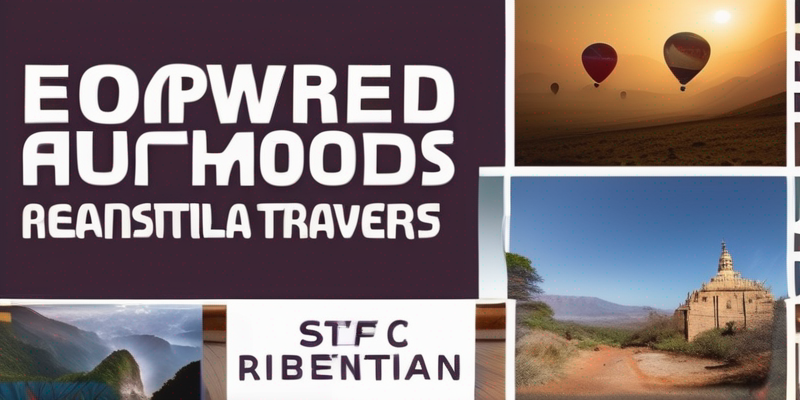The world's most remote destinations offer unparalleled experiences—pristine landscapes untouched by mass tourism, authentic cultural exchanges, and the profound sense of accomplishment that comes from charting your own path. As a solo female traveler, venturing into these distant corners presents unique challenges, but with proper preparation, awareness, and confidence, these journeys can be transformative rather than intimidating. While mainstream travel advice often focuses on urban destinations, navigating remote areas requires specialized knowledge and heightened awareness. From the isolated mountain villages of the Himalayas to the distant islands of the South Pacific, this guide provides essential safety strategies tailored specifically for women traveling alone in places where infrastructure, communication, and familiar support systems may be limited.
Pre-Trip Research and Preparation
Marrakech:
Thorough research forms the foundation of safe solo travel in remote regions. Beyond standard guidebook information, dig deeper into local gender norms, appropriate dress codes, and cultural expectations. Connect with other female travelers through online forums like Women Who Travel or Female Travel Bloggers to gather first-hand insights about specific destinations. These communities can provide invaluable advice about areas where women have felt comfortable or uncomfortable, local customs that aren't mentioned in travel guides, and practical tips for navigating gender dynamics.
Fez:
Create a detailed itinerary with contingency plans, and share it with at least two trusted contacts. Include accommodation details, transportation plans, and scheduled check-in times. For extremely remote destinations, research the nearest embassies, hospitals, and reliable transportation options before arrival. Consider investing in a satellite communication device like a Garmin inReach for areas with no cell service—these allow you to send text messages, share your location, and signal for emergency assistance from virtually anywhere on the planet.
Chefchaouen:
Prepare a comprehensive first-aid kit tailored to your destination's specific health risks, and ensure your travel insurance explicitly covers remote areas and adventure activities. Many standard policies exclude certain regions or activities, so read the fine print carefully. Finally, prepare digital and physical copies of all important documents, including your passport, insurance details, emergency contacts, and embassy information, storing them in multiple secure locations.
Strategic Accommodation and Transportation Choices
To truly experience Morocco, dive into its rich culture. Here are some highlights:
Culinary Classes:
In remote destinations, accommodation options may be limited, making advance research crucial. Prioritize properties with positive reviews from solo female travelers, secure entry systems, and 24-hour reception or staff presence. In extremely remote areas where formal accommodations are sparse, consider homestays arranged through reputable organizations—these often provide cultural immersion while offering the security of local family connections and knowledge.
Music Festivals:
When booking transportation, prioritize safety over savings. In remote regions, the cheapest option is rarely the safest. Research transportation providers thoroughly, and when possible, book through established companies rather than arranging impromptu rides. For long-distance journeys through remote areas, consider sharing your transportation plans with your accommodation hosts at both departure and arrival points, creating accountability and awareness of your movements.
Artisanal Workshops:
When navigating unfamiliar terrain, particularly after dark, invest in secure transportation even when budget constraints are a concern. Many remote destinations have informal community transportation networks—learn about these through local women or accommodation providers rather than from random strangers. If you must travel after dark, arrange transportation through your accommodation or a trusted local contact whenever possible.
Building a Safety Network in Unfamiliar Territory
Plan your visit around one of Morocco's vibrant festivals to experience the culture at its best:
Marrakech International Film Festival:
One of the most effective safety strategies for remote travel is establishing connections with trustworthy locals and fellow travelers. Upon arrival at a new destination, identify reliable local resources—a female staff member at your accommodation, a local tour guide with excellent reviews, or connections through reputable volunteer organizations. These individuals can provide invaluable advice about areas to avoid, cultural nuances, and emergency assistance if needed.
Fez Festival of World Sacred Music:
Consider participating in group activities during your first days in a new remote location. This provides a controlled environment to observe local dynamics and potentially connect with like-minded travelers. Women-focused tour operators like Wild Women Expeditions or Adventure Women can be excellent resources for both guided experiences and connecting with other solo female travelers in remote regions.
Gnaoua World Music Festival:
Leverage technology to maintain a virtual safety network. Apps like GeoSure provide neighborhood-specific safety ratings for women, while Find My Friends allows trusted contacts to monitor your location. For extremely remote destinations, establish regular check-in protocols with someone who will take immediate action if you miss a scheduled communication. Remember that in truly remote areas, connectivity challenges may require creative solutions—satellite messengers, pre-arranged check-in schedules, and clear emergency protocols become essential components of your safety network.
Projecting Confidence While Maintaining Awareness
Traveling sustainably ensures that Morocco's beauty is preserved for future generations. Here are some tips:
- In remote destinations, your demeanor can significantly impact your safety. Practice confident body language—walk purposefully, maintain appropriate eye contact according to local customs, and project assurance even when feeling uncertain. This doesn't mean abandoning caution; rather, it's about balancing approachability with clear boundaries. In many cultures, appearing lost or confused can make you a target for unwanted attention or scams.
- Develop situation-appropriate awareness skills. In remote settings, this means being attuned to both natural and social environments. Learn to recognize warning signs in natural settings—changing weather patterns, unsafe terrain, or wildlife indicators. Simultaneously, hone your ability to read social dynamics, identifying potentially uncomfortable situations before they escalate. Trust your intuition—if a situation feels wrong, remove yourself promptly without concern for appearing rude.
- Adapt your communication style to the cultural context while maintaining your boundaries. In some remote communities, being overly friendly may be misinterpreted, while in others, aloofness might be considered offensive. Research cultural norms around female behavior before arrival, but remember that respecting local customs doesn't mean compromising your safety or comfort. Develop polite but firm responses to unwanted attention, and practice delivering them confidently. When navigating language barriers, simple phrases in the local language combined with clear body language can effectively communicate boundaries.
Traveling solo as a woman to remote destinations combines unique challenges with extraordinary rewards. By thoroughly preparing, making strategic choices, building safety networks, maintaining confident awareness, and utilizing appropriate tools, you can minimize risks while embracing the profound experiences these journeys offer. Remember that being safety-conscious isn't about living in fear—it's about empowering yourself with knowledge and preparation that creates the freedom to fully immerse in remarkable places. The most memorable adventures often lie beyond the well-trodden path, and with these strategies, you're equipped to explore them with confidence. The world's remote wonders await your discovery, and you have everything you need to experience them on your own terms.

